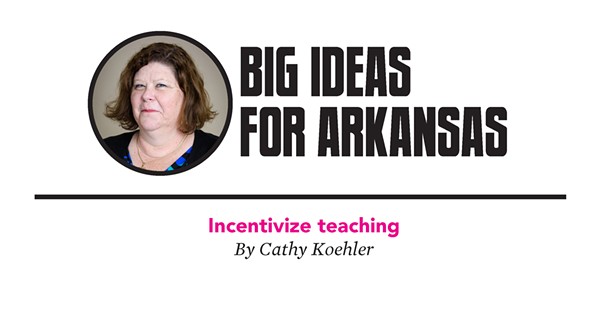
As baby-boomers begin to retire and more students enter our schools, Arkansas faces a serious dilemma: a shortage of teachers.
Unfortunately, we also face an effort to deprofessionalize education by privateers hoping to cash in on the public dollars currently going to our students.
Long-term solutions are needed to keep educators in the profession by improving working conditions, increasing preparation and mentoring, reducing over-burdensome paperwork, and providing adequate resources that will enable them to do their jobs.
Summed up in a word: respect.
We know having qualified educators in the classroom is the biggest factor in student achievement. We also know teachers become more effective as they spend more time in the classroom.
Unfortunately, across the state and nation we are seeing declining numbers of new people pursuing teaching degrees, as well as epidemic levels of teacher attrition.
Teacher turnover has serious implications on the quality and stability of the education profession and student success. When early career educators leave the profession, districts encounter tremendous economic turnover costs, and often resort to back-filling vacancies with out-of-field teachers or substitute teachers, canceling program offerings, or creating larger classes.
The state Bureau of Legislative Research found that the five-year teacher attrition rate was over 36 percent. That’s more than one-third of new Arkansas teachers leaving the profession before they make it to the most effective years of their career.
As the teacher pipeline dries up, it is becoming harder and harder for schools to attract and retain qualified educators, especially in lower income areas.
The attrition rate is even higher in rural areas where districts can’t afford to keep up buildings, let alone pay teachers the same salary as more populated areas with higher property tax collection.
In addition, teachers in these schools often face greater challenges associated with students living in poverty.
Arkansas is working to incentivize teaching in rural and high-poverty schools, but the current bonuses don’t make up for the incredible difference in salaries you find in school districts across the state.
The people most likely to commit for the long term to these communities are those who grew up there and already know it as home.
Arkansas needs to develop a more comprehensive support network for new teachers, and we need to do a better job of encouraging students from underserved communities to become the next generation of teachers in their hometown.
This “grow your own” strategy should include increased scholarships or student loan forgiveness so there is no income barrier keeping these students from pursuing an education career. We also have an opportunity to ramp up the Arkansas Department of Education’s Teacher Cadet program, created to recruit homegrown educators. This program is already working in dozens of schools across the state to attract our best and brightest high school students to the teaching profession.
We must bolster this increased access with better help for new hires. Arkansas should ask its longtime educators to coach their new colleagues. Engaging and supporting educators as early as possible will stem the tide of departures and create a strong and sustainable teaching force. This will give experienced educators the opportunity to share their incredible knowledge, while training the next generation of teacher leaders.
Finally, we need to understand this issue is bigger than school districts or even the state Department of Education. If we want more people to become educators, we need to make teaching an attractive and respected career again.
Everyone in the community, from local chambers to legislators, parents and other city leaders must come together to acknowledge these problems and work together to support their schools and the educators who fill them.
How much voice, how much say, do teachers have collectively in the schoolwide decisions that affect their jobs? Are teachers treated as professionals? Are we providing safe and comfortable working (and learning) environments for educators and their students?
Achieving affirmative answers to these questions depends on having strong educator leaders who will advocate for their profession and their students. It also depends on the rest of us to support their efforts and treat the teaching profession with the respect it deserves.
Cathy Koehler is president of the Arkansas Education Association.
Read more Big Ideas HERE.





